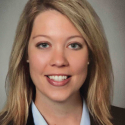When Amanda Schnell moved from Kansas to the Southeast in 2017 for a rheumatology fellowship at the University of Alabama at Birmingham (UAB) Hospital, she quickly noticed an unfamiliar challenge: Rural patients in the South seemed to have much less access to medical care compared with rural patients in the Midwest. Surprised and concerned about these disparities, she saw an opportunity to help in an email from the ACR seeking fellows to advocate on behalf of patients. She took the chance and hasn’t looked back.

Dr. Schnell
Dr. Schnell is now an assistant professor in the UAB Division of Clinical Immunology and Rheumatology, associate program director of the Rheumatology Fellowship Program at UAB and a member of the ACR’s Government Affairs Committee. This year, she is managing the Advocacy 101 program held in conjunction with Advocates for Arthritis. She spoke with The Rheumatologist about what led her to push for change and how advocacy has become an integral and valuable part of her life today.
The Rheumatologist (TR): How did you become interested in rheumatology, and what was your path from the Midwest to the Southeast?
Dr. Schnell: I became interested in rheumatology during medical school at the University of Nebraska, where I got to learn from excellent rheumatologists who had a passion for patient care and research and really ensuring that their patients did their best. I continued to be interested during my residency at the University of Kansas Medical Center, and then I moved to UAB for my rheumatology fellowship. I’m still in Alabama, now as a clinician-educator and I see patients at the Kirklin Clinic of UAB Hospital and at the Birmingham VA Medical Center.
TR: Your first experience with advocacy came once you moved to Alabama. What led you to get involved?
Dr. Schnell: I’m from a rural town of about 7,000 people in Nebraska, but when I made the move to the South, the rural communities seemed a little bit different. I don’t know if it was the time in my life that made me more aware or if it was the move to unfamiliar surroundings, but I really noticed a disparity in access to treatment for rheumatologic conditions and in access to care overall. It seemed to me that there were fewer medical centers and hospitals and less availability of specialty care in the South. And maybe it was because I was prescribing more expensive medications, but the patients seemed much less able to afford them, so their diseases were progressing. It was frustrating for the patients and also for me, as the prescriber, to figure out how to help these patients who had limited resources.
It was during those first few weeks of fellowship that I received an email from the ACR looking for fellows who were interested in going to Washington, D.C., and becoming an advocate for their patients. I really didn’t know anything about advocacy, but I thought, “This is perfect. I am seeing this need, and this is a way I can help.” So that’s how I initially became interested and started out as an advocate. The ACR staff have been super helpful from the start, and I’ve become more involved and more interested in advocacy since.
TR: Have you seen advocacy make a difference?
Dr. Schnell: Oh yes. One example is an early success I saw from advocacy work when I was a fellow. At that time, Medicare had coverage caps for physical therapy (PT), so a patient who had received [the annual PT allotment] for something like a knee replacement and then two months later had a stroke would not qualify for additional PT. Helping to get that cap removed was beneficial not only to rheumatology patients, but to all patients. That continues to inspire me today to continue advocating for change.
TR: How has the pandemic affected advocacy work?
Dr. Schnell: The methods have been a little different, such as meeting with government representatives and their staff members on Zoom instead of in person, but I think we can see that our advocacy efforts have gone very well this past year. Many of the issues that we advocated for early in the pandemic centered on access to care, which included insurance coverage for telehealth visits as well as telephone visits for patients without internet connections. Those are things that patients and doctors have come to appreciate, so hopefully they will continue after the pandemic.
TR: How does being part of a broader advocacy community affect your experiences during the pandemic?
Dr. Schnell: It has been a great way for me to stay up-to-date on issues and has also helped with some of the isolation. As clinicians, we have all continued to see patients, but we also have been spending a lot of time alone in our offices. So both personally and professionally, it has been helpful and gratifying to be part of a bigger rheumatology community that is advocating as a whole to move the profession forward.
TR: Going forward, it sounds like advocacy will remain a key part of your service as a healthcare professional.
Dr. Schnell: Certainly. Sometimes I know we may feel like nothing changes, but it really does. We have a track record of making positive changes for rheumatology and for our patients. Besides, if we don’t advocate, our representatives will only hear from other interests that may not have patients’ best interests in mind. We need to use our voices to stand up for our profession and for our patients. It’s working. We are changing policy to make our patients’ lives better.
Leslie Mertz, PhD, is a freelance science journalist based in northern Michigan.
Every ACR/ARP member can advance rheumatology by being an advocate for rheumatology issues, practices and patients. Find tools and resources from the ACR to guide your advocacy journey.


